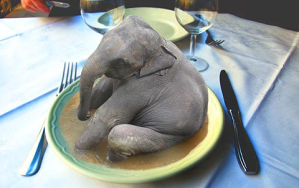
How do you eat an elephant?
“There is only one way to eat an elephant: a bite at a time.”
Desmond Tutu – Noble Prize laureate, anti-apartheid campaigner
In using this old African proverb, what did Desmond Tutu mean?
How often are we confronted with tasks or challenges that seem insurmountable?
The first action in confronting a major project is to set the goal…………that is, eating the elephant.
However, in order to reach the goal of eating an elephant you need to plan and set incremental time bounded goals. In this case, it’s eating the elephant one bite at a time. Setting goals is an important discipline for business owners and managers. Furthermore, setting goals also helps in creating a meaningful, satisfying, and successful life.
What has eating an elephant got to do with business?
Small goals have several advantages in giving you:
- something that is tangible and achievable on which you can focus
- the satisfaction of achieving the small goals
- the way to achieving your major goal
A junior IT employee I once employed was daunted by the number of tasks he had to complete. He said he felt helpless and was not enjoying his role as he ‘was not getting anywhere’. We devised a simple plan that visibly showed progress. Using a simple exercise book, he listed the jobs to be done, both large and small. When he completed a task, it was crossed off the list and dated. He immediately had a visible and simple method of tracking his progress. This resulted in a significant improvement in his job satisfaction and productivity.
Job satisfaction, like life satisfaction, is higher if you see life or your job as a series of small milestones or goals along the way. Remember life, and this includes your working life is not a destination but a journey.
Whilst the practice of goal setting is important, there are certain ways to set goals that will increase the chance of success, including using the acronym, SMART for setting goals:
Specific – be very clear on what you wish to achieve. It also helps to visualise your goals. Using the elephant analogy, an African elephant weighs around, 5,000 kilograms.
Measurable – set a goal where you can measure your progress toward achieving it. Record the kilograms of the elephant you eat each week. As Peter Drucker, the famous management thinker said, “what gets measured gets done.”
Attainable – your goals need to be reasonable and realistic. You then have a better chance of success. With the elephant example, eating 100 kilograms per week would be unrealistic whereas 10 kilograms is achievable. This moves you towards your final goal, which is eating the elephant. However, at 10 kilograms per week it would take you nearly 10 years to eat the elephant by yourself. This brings us to the next consideration.
Relevant – set a goal that has meaning, whether personal or for your career or business. There is little point in having goals that have no meaning as you are wasting both time and resources. Also, you are unlikely to be motivated when the going gets tough. Due to the time involved in eating the elephant by yourself, it is not relevant or practical, even if you like elephant meat!
Time-Bound – by setting a timeline or deadline you are forced to commit. This includes the small goals along the way that lead up the major goal. In meeting both the relevance and time criteria, to eat the elephant before it becomes rotten, you could enlist 100 of your fellow villagers and it would be completed in only 5 weeks!
Note: 10 kgs per person per day multiplied by 100 villagers and 5 weeks equals 5,000 kgs
Often when I sit in front of a client, they are daunted by the task to improve their business’ performance.
How do we solve the apparently daunting task?
By using the ‘eating the elephant, one bite at a time’ approach. We break down the business plan into initially, 3 year goals, then 1 year goals and more importantly 90 day ‘bite size’ goals with actions that add up to complete the business plan.
Goals are dreams with realistic and achievable deadlines.
Motivational coach Zig Ziglar stated that “a goal properly set is halfway reached.” If we remember, setting a goal is just like eating an elephant, bite by bite, and bit by bit, we can reach firstly, our smaller goals before the final goal.
What is going to be your approach when you are confronted with a daunting task?

Dear David
Absolutely brilliant example.
Regards
Sandy
Thanks Sandy. This is a favorite theme used by my wife when confronted with what seems an impossible task. Furthermore, it emphasises the need for planning and persistence.
Ok – can you change the typo — Nobel please